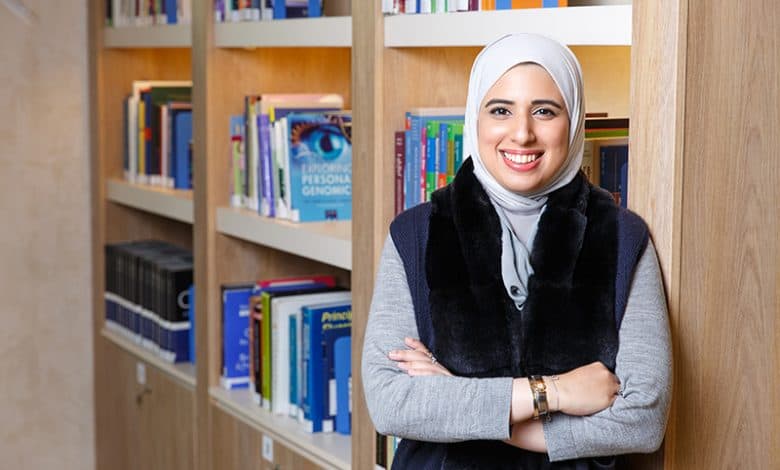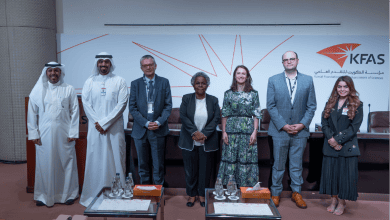Discovering the Psycho- logical Impact of COVID-19 on Healthcare Providers in Kuwait

By Emma Stenhouse
The COVID-19 pandemic had a dramatic impact on the mental health and wellbeing of many Kuwaitis – but some may argue those who have suffered most are the medical staff working on the frontlines. Providing care for those citizens suffering from the effects of COVID-19 brings with it the potential of great psychological pressure for healthcare providers (HCPs). Until now, the impact of this pandemic on the mental health and wellbeing of HCPs hasn’t been fully investigated. But Dr. Dalal Alsaeed plans to change that.
Her research into the psychological pressures facing medical staff is of utmost importance, according to Alsaeed. “There is a need to fully support medical staff in these unprecedented circumstances where difficult decisions need to be made in an ever-evolving environment; psychological support is essential,” she said.
Alsaeed’s extensive knowledge of qualitative data collection, combined with her positon as an advocate for patient and public involvement in research, places her in the perfect position to lead this important initiative.
Alsaeed began her educational career at Liverpool John Moores University in the UK, where she a master’s in pharmacy. She then went
on to work at both the Ministry of Health and Al-Sabah Hospital. After this, she went on to complete a master’s in
clinical pharmacy, followed by a doctorate in pharmacy practice, both gained at University College London in the UK. After graduating, she joined the Dasman Diabetes Institute (DDI) as a post-doctoral fellow. She is now the Clinical Operations Manager at DDI, one of KFAS’ centers, and leads multiple qualitative research efforts, focused on people living with Type 1 and 2 diabetes. At the same time, she mentors medical students and is supervising a PhD student from Ulster University.
Protecting the health and safety of HCP in, not only Kuwait, but across the world is vital, according to Alsaeed. “HCPs are vital resources for every country. Their health and safety are crucial not only for continuous and
safe patient care, but also to mitigate
the effects of any outbreak,” she said. HCPs suffering from psychological pressure are at danger of burnout and may decide to eventually leave the profession. Another risk is the increase in medical errors, alongside negative impacts on the quality of care given to patients.
In order to support these pillars of our society in the best way possible, the first step is discovering the challenges they face in more detail, and then implementing potential support interventions to improve their psychological wellbeing. “HCPs play a vital role in reducing psychological stress in patients and their role needs to be brought to the forefront,” Alsaeed said. “If this is not addressed early, the long-lasting effect will debilitate healthcare services. HCPs are well known as givers and often put their health on the backburner to assist others, and it is our duty to support them fully.”
Alsaeed’s research into the primary pressures faced by HCPs initially centered on semi-structured interviews conducted by psychiatrists via video consultations. These were then analyzed using principles of thematic framework analysis. The results, Alsaeed said, will
be used to “develop targeted interventions that improve psychological wellbeing and help supporting HCPs all HCPs’ needs.
“Based on the findings and participant experiences, the availability of support groups, having a resident psychiatrist for one-to-one sessions, and mindfulness sessions can all meet their needs,” Alsaeed said.
تقترح النتائج الأولية للبحث أن كوفيد19- كان له بالفعل تأثير نفسي كبير في مقدمي الرعاية الصحية الذين يعتنون بمرضى كوفيد. وتقول د. السعيد إن معالجة هذا الأمر مسألة ضرورية. وتورد أربعة مجالات رئيسية يحتاج فيها مقدمو الرعاية الصحية إلى دعم إضافي: القضايا النفسية وظروف العمل واللوائح التنظيمية واستراتيجيات المواجهة واحتياجات الدعم.
من الواضح أيضًا أن تدخلات الدعم النفسي لمقدمي الرعاية الصحية محدودة حاليًا، وهناك حاجة لتوفير مزيد من السبل لتلبية جميع احتياجاتهم. تقول د. السعيد: “بناءً على النتائج وخبرات المشاركين، فإن توافر مجموعات الدعم ووجود طبيب نفسي مقيم لإجراء جلسات فردية وجلسات التفكير اليقظ Mindfulness sessions يمكنها مجتمعة أن تلبي احتياجاتهم”.
She also goes on to note the importance of additional education and training for HCPs, so they can recognize the symptoms of depression, anxiety, and burnout. “It was evident that HCPs
have difficulty identifying these,” she said.
The results
of this initial mindfulness intervention are now being refined before a country-wide launch. The goal, according to Alsaeed, is to “ensure HCPs are inherently resilient to deal with
any future outbreaks and to support
them mentally.”
Alsaeed’s research has been supported by a KFAS research grant and were facilitated by Dr. Abdulla Al-Ozairi and his team at Kuwait University and the Ministry of Health. Alsaeed said she is “privileged to be the principal investigator” of this study, which is to date, the only research based initiative of its kind in Kuwait. Placing a higher importance on mental health research in Kuwait must be a priority, said Alsaeed, with qualitative research being a key strategy when developing interventional studies.




